I quit the internet for nine days. Here’s how that went.

I fully realize this article is cliche’ as hell. It’s been written hundreds if not thousands of times and most likely, all these articles come to the same conclusion: we need to spend less time on our phones.
The idea of social media detox has been floating around for years, but recently, I started to feel like I really needed to try it. I’ve been finding myself scrolling Twitter endlessly. Pulling out my phone the minute a friend uses the bathroom during dinner. It feels like an itch I need to scratch and I really really hate it. I loathe it.
Also read: Visible changed this rural techie’s life for the better
A couple of months ago, I was taking a bath on a quiet Saturday night. I’d been there for two hours. Normally, this would seem like a good thing. I was taking some time for myself to relax and not worry about work and personal issues. It was just me and the water, right?
Except I wasn’t really relaxing. I was on Twitter, and Instagram, and Reddit. I jumped between the apps almost anxiously as I waited for new updates to roll in. And pretty suddenly, I saw myself from a birds-eye view, and I felt gross.
I became obsessed with information, and later on, the constant stimulation it represented.
Our constant need for entertainment, engagement, and information stems from our access to information. When I was a kid, I could only learn, read, and explore the internet when I was at home at our computer, when my mom wasn’t on the phone. And I became obsessed with that computer. But more than anything, I became obsessed with information, and later on, the constant stimulation it represented.
So when smartphones first started to emerge, it was natural that I wanted access to this information in more places. And it was fine for a while. When the biggest apps were Google Search, Maps and News, it was easy to use my phone as a tool, not an addiction. But then social media took over the internet, and subsequently, our attention.
Sitting in the bath that Saturday night, I thought about all the things I could be doing if I wasn’t mindlessly scrolling social media. This isn’t a story about how I could have been more productive without these apps. There is always time for things if you want them enough. This is about my personal fight for my attention, and the quite literal detox I felt when I tried to get it back.
So I finally took the advice of all those reporters and novelists telling me to quit for a while. I stopped using social media for nine days and traveled around Japan using just maps. Here’s how that went.

The inside of my brain.
Unexpectantly, my first day felt surprisingly… fine. I didn’t feel the need to jump on Twitter and see what people were up to. I was focused on finding a camera I’d come to Japan specifically to get. And that’s what I did. For the first day, I was focused solely on that. Which is a form of stimulation, to be fair. That’s probably why the next few days were much more difficult. So difficult, that I posted photos of my camera on Twitter, using the web browser on my phone. I couldn’t help it.
The mornings felt significantly different than before. Normally, I wake up with a slew of Twitter, Slack, Instagram, Messenger, and Telegram notifications, and I spend at least an hour checking them all. But I deleted them. This time, I’d glance at my phone and see nothing. And this was equal parts freeing and stressful.
Notifications have created a sense of urgency in my life. Everything feels important.
Notifications have created a sense of urgency in my life. Everything feels important. Someone liked my twitter post? I have a new Instagram follower? Surely these things need to be addressed! And so, waking up to effectively nothing on my phone felt weird. I felt anxious.
And I fought that feeling for a few days. It took four days to feel 95% okay with being totally offline. In this time I had to continuously remind myself that I was fine. No one will actually notice if I’m not tweeting every day. I can miss some Slack messages. I planned this time off in advance.
I filled this time by trying to be present in what I was doing. I was attentive to my surroundings and tried to focus entirely on what was in front of me. I visited new areas of Tokyo and shot photos around the city. The days passed slowly at first but eventually sped up as I became more comfortable leaving my phone in my pocket. I realize this sounds dramatic, but it’s a weird transition going from seven hours of screen on time per day to half an hour. Reviewing phones for a living can lead to some bad habits.
It was only on the fifth day that I felt completely relaxed. Screen time on my phone completely dropped off. I tried my hardest to take in the light around me. This worked in short bursts if I kept reminding myself to do it. But sustained attention is damn hard in 2020.
I did catch myself daydreaming a lot – probably my brain compensating for the lack of external stimulation. But daydreaming doesn’t make me feel stressed. This is a continuous thought process, not stuttered hits of dopamine. And that feels better. It feels more neutral.
I fully enjoyed the remaining four days offline. I went on multiple multi-hour train rides and felt great. I went on hikes and sat by lakes and I felt good. There was no urgency. There was no worry about what might be happening around me. The world was passing me by, but I didn’t just feel okay with that idea – I enjoyed it. I was less connected than I’d been in the last ten years. And I loved that.
When I got back to America I felt much more relaxed than when I’d left, but I reinstalled those apps pretty much immediately. I didn’t feel like I needed to. It just felt I was just getting back to real life. I have to have Slack when I’m on the clock. And I love Twitter! I couldn’t just abandon that. But slowly, that addiction crept back in.
It probably took two days for me to fall back into my cadence of anxiously refreshing Twitter.
It probably took two days for me to fall back into my cadence of anxiously refreshing these apps. Which I didn’t really realize until a week or so later, when I found myself doing it again, in the bathtub. And I had the same bird’s eye realization I had before.
I don’t think that smartphones are inherently bad. If you can control your phone instead of letting it control you, these are invaluable tools that can teach you nearly anything, give you access to nearly anyone, and get you to places you’ve never been. Frankly, they’re incredible. But apps weren’t designed to be used in moderation, they were designed to be addictive. And I’ve fallen victim.
The only solution I can find to this problem is working on how I consume these apps. Twitter can be an amazing platform. I’ve made friendships through it that would never have formed and learned about issues I didn’t know existed. Reddit has taught me so much about niche hobbies that I thought only I loved. But just like Instagram, Pinterest and others, sometimes they can feel like too much. Some days, I feel like I’ve run out of memory.
If you can control how you interact with them, they can bring real value to your life. Otherwise, it’s far too easy to let them mindlessly eat your life away. Try to take some time off and see how you feel. It will probably be hard, but I can guarantee you won’t regret it.
Read next: Forget flagships, mid-range phones are making the biggest technological leaps
from Android Authority https://ift.tt/2uCuwJu





No comments: